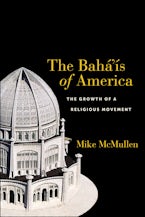The Bahá’ís of America
The Growth of a Religious Movement
The Bahá’í Faith had its origins in nineteenth century Shi’ite Islam, but embraces Abraham, Krishna, Moses, Buddha, Jesus, and Muhammad—among others—as prophets, each seen as a divine messenger uniquely suited to the needs of his time. The Bahá’í community has spread to become the second most geographically widespread religion in the world. It has a 120 year history in the United States, where members have promoted their core belief that all people are created equal.
American Bahá’ís have been remarkably successful in attracting a diverse membership. They instituted efforts to promote racial unity in the deep South decades before the modern civil rights movement, and despite lip service to fostering multi racial congregations among Christian churches, over half of American Bahá’í congregations today are multiracial, in comparison to just 5 to 7 percent of U.S. Christian churches. This level of diversity is unique among all religious groups in the United States.
As the story of a relatively new religious movement, the history of the Bahá’ís in America in the 20th and early 21st centuries offers a case study of institutional maturation, showcasing the community’s efforts to weather conflict and achieve steady growth. While much scholarly attention has been paid to extremist religious movements, this book highlights a religious movement that promotes the idea of the unity of all religions. Mike McMullen traces the hard work of the Bahá’ís’ leadership and congregants to achieve their high level of diversity and manage to grow so successfully in America.
Contributor Bios
Reviews
"Suitable for both the general reader and the specialist scholar." ~ Nova Religio
"[McMullen] targets the internal institutional and organizational development of the Bahai in the US from 1963 to 2013, a period of growth and development for the movement." ~ Choice
"Provides the first comprehensive overview of the development of the American Baháí community from 1963 to 2013, a crucial fifty year period that saw its membership expand fifteen times and its resources , literature, and capacities develop commensurately. McMUllen explores the challenges of consolidation of the new members, of building new institutions, and of reaching to the public with the Baháí teachings, challenges that remain today. By focusing on the letters from the Universal House of Justice, the Baháí Faiths world-wide governing body, and those of the National Spiritual Assembly of the Baháís of the United States, he provides a unique window into the role of Bahá'í institutions in planning, shaping, and steering the Faiths growth." ~ Robert H. Stockman,author of The Bahá’í Faith: A Guide for the Perplexed
"Through a careful analysis of thousands of documents, data collected from the Faith Communities Today (FACT) research project, and interviews with adherents, McMullen presents a fascinating picture of the American Baháícommunity from 1964 to 2014. Those interested in understanding how an emergent global religion has addressed issues such as race, ethnicity, and immigration, and dealt with religious persecution, while at the same time developing its institutions and engaging in community building, will find much of interest here." ~ Sholeh A. Quinn,University of California, Merced
"The Bahais of Americais recommended for university research libraries, and as a possible textbook for courses in the sociology of religion." ~ Reading Religion
"In his exhaustively researched and extremely detailed volume, McMullen uses the institutional history of the Bahá’í faith in the United States to explore how the tradition came to achieve such prominence and embody this diversity in the span of a few decades." ~ The Journal of Religion
 This work is licensed under a
Creative Commons Attribution-NonCommercial-ShareAlike 4.0 International License
(CC BY-NC-SA).
This work is licensed under a
Creative Commons Attribution-NonCommercial-ShareAlike 4.0 International License
(CC BY-NC-SA).


